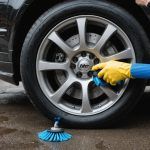As the winter months approach, preparing your vehicle for long journeys becomes crucial. The cold weather, snow, and icy conditions can pose significant challenges to your safety on the road. It’s essential to ensure your car is fully equipped to handle the harsh realities of winter driving. In this article, we will cover the necessary steps you should take to prepare your winter vehicle for an extended trip during the colder months. We will discuss checking your tires, battery, and emergency kit, and share tips to keep you safe on the road.
Check Your Tires
Your tires are one of the most critical components of your vehicle when it comes to winter driving. The right tires can significantly affect your driving experience in snow and icy conditions. First, ensure you have the appropriate winter tires installed. These tires are designed to provide better traction on snow and ice compared to all-season tires. Look for the ‘M+S’ designation, which indicates that the tire is suitable for mud and snow.
Also read : How do advanced driver assistance systems (ADAS) work and how can they improve safety?
Next, check the tire pressure. Cold weather can cause air to contract, leading to lower tire pressure. Under-inflated tires can reduce handling and increase the risk of blowouts, especially when driving on icy roads. Make sure to check the tire pressure regularly and inflate them to the manufacturer’s recommendations.
Additionally, inspect the tread depth of your tires. A good rule of thumb is the penny test: insert a penny into the tread with Lincoln’s head facing down. If you can see all of Lincoln’s head, it’s time to replace your tires. Having adequate tread depth is vital for maintaining grip on slick surfaces.
Also to read : How can you educate yourself about the latest automotive technologies and trends?
Lastly, consider keeping a tire repair kit in your vehicle. This kit can help you deal with minor punctures and emergencies while on the road. Preparing your tires adequately can ensure that you’re ready for whatever winter drives your way.
Battery Check for Cold Weather Performance
Winter weather can be tough on your car’s battery. The cold can reduce battery capacity and lead to starting issues. Before embarking on a long winter journey, it’s important to check the health of your battery. Start by looking for any signs of corrosion on the terminals. If you notice white, ashy deposits, clean them off to ensure a good connection.
Next, consider testing the battery’s voltage. Many auto stores offer free battery testing. A fully charged battery should read around 12.6 volts or higher. If your battery is older than three years, it’s wise to have it tested even if it seems to be working fine. Cold temperatures can sap the power from an aging battery much faster.
In addition to checking the battery, it’s a good idea to inspect the cables and connections. Loose or damaged cables can cause starting issues. If you find anything suspicious, it may be best to consult with a professional mechanic to ensure your vehicle remains reliable throughout your trip.
Lastly, if your battery is nearing the end of its life, consider replacing it before hitting the road. A new battery can provide peace of mind, ensuring you won’t be left stranded in the cold.
Preparing an Emergency Kit for Winter Travel
No matter how well you prepare your vehicle, winter driving can be unpredictable. An emergency kit is essential for ensuring you’re ready for any situation that may arise on the road. Start by assembling a basic kit that includes items such as a flashlight, batteries, a first-aid kit, and a multi-tool. These tools can be invaluable in case of a breakdown or emergency.
Next, include warm blankets or sleeping bags in your kit. If your vehicle were to break down in cold weather, having something to keep you warm is crucial. Additionally, pack non-perishable snacks and bottled water. If you find yourself stranded, these supplies can help sustain you until help arrives.
Don’t forget to add a shovel, ice scraper, and sand or kitty litter to your emergency kit. A shovel can be useful if you get stuck in the snow, while kitty litter can provide traction under your tires. An ice scraper is essential for clearing your windshield and mirrors before driving in winter conditions.
Finally, consider including a portable phone charger or a power bank in your kit. Keeping your phone charged can be a lifesaver in an emergency, allowing you to call for help or navigate your way to safety.
Maintain Fluid Levels and Condition
Keeping your vehicle well-maintained involves more than just checking the tires and battery. Proper fluid levels are vital for safe driving in winter. Begin by checking your antifreeze levels. A proper antifreeze mixture will prevent your engine from freezing in extremely cold temperatures. Ensure the coolant is at the recommended levels and consider using a winter blend for optimal performance.
Next, check your windshield washer fluid. Winter driving often involves dealing with snow, grime, and road salt, making it essential to maintain a full reservoir of washer fluid. Opt for a winter formula that won’t freeze and provides effective cleaning in cold conditions.
Additionally, inspect your oil levels and consider using a low-viscosity oil in winter. This can help your engine start more easily in cold weather. If you’re unsure which oil is best for your vehicle, consult your owner’s manual.
It’s also advisable to check the condition of your brake fluid and power steering fluid. Colder temperatures can affect the viscosity of these fluids, which can impact performance. Ensuring that all fluids are at the proper levels and in good condition can help maintain your vehicle’s reliability during your winter travels.
Preparing your vehicle for a long winter journey involves several critical steps. From checking your tires and battery to assembling an emergency kit and maintaining fluid levels, each aspect plays a crucial role in ensuring your safety on the road. By taking the time to prepare your car properly, you can enjoy peace of mind during your travels. Remember, winter can be unpredictable, but with the right precautions, you can keep your vehicle in optimal condition and reduce the chances of encountering emergencies. Safe travels this winter!











